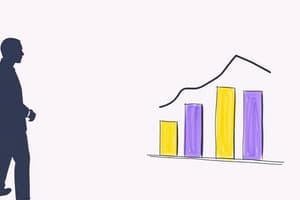Podcast
Questions and Answers
Who is considered the 'Father of Modern Economics'?
Who is considered the 'Father of Modern Economics'?
- Thomas Malthus
- Leon Walras
- Adam Smith (correct)
- Karl Marx
What concept did Adam Smith introduce in his work?
What concept did Adam Smith introduce in his work?
- Labor Theory of Value
- Invisible Hand (correct)
- Comparative Advantage
- Planned Economy
What did Karl Marx advocate for in his economic theories?
What did Karl Marx advocate for in his economic theories?
- Monetary Policy
- Communism (correct)
- Private Ownership
- Capitalism with Regulation
Which philosopher wrote 'Al-Muqaddimah' discussing labor and profit motive?
Which philosopher wrote 'Al-Muqaddimah' discussing labor and profit motive?
What key idea is associated with microeconomics in terms of decision-making?
What key idea is associated with microeconomics in terms of decision-making?
Which aspect of economic theory did John Maynard Keynes contribute to?
Which aspect of economic theory did John Maynard Keynes contribute to?
Which of the following is a key characteristic of macroeconomics?
Which of the following is a key characteristic of macroeconomics?
What is one benefit of government intervention in economic markets?
What is one benefit of government intervention in economic markets?
What does the term 'economics' primarily refer to?
What does the term 'economics' primarily refer to?
Which statement best describes microeconomics?
Which statement best describes microeconomics?
What tools does macroeconomics commonly use for analysis?
What tools does macroeconomics commonly use for analysis?
Which factor is NOT typically analyzed in microeconomics?
Which factor is NOT typically analyzed in microeconomics?
How do microeconomics and macroeconomics differ in scope?
How do microeconomics and macroeconomics differ in scope?
Which of the following is a limitation of microeconomics?
Which of the following is a limitation of microeconomics?
What primary problem does macroeconomics aim to resolve?
What primary problem does macroeconomics aim to resolve?
What is one of the primary importance of microeconomics?
What is one of the primary importance of microeconomics?
Flashcards are hidden until you start studying
Study Notes
Economics Overview
- The term "economy" originates from the Greek "Oikonomos," meaning "one who manages a household."
- Economics examines how societies manage scarce resources to convert them into goods and services, meeting unlimited wants.
- Economics can be viewed as both an art and a science, emphasizing its complexity in real-world scenarios.
Branches of Economics
-
Microeconomics
- Focuses on individual consumers, firms, and families.
- Tools include demand and supply analysis.
- Covers topics like product pricing, consumption, and economic welfare.
- Important for determining prices and factors of production: land, labor, entrepreneurship, and capital.
- Limitations stem from unrealistic assumptions about human behavior in a social science context.
-
Macroeconomics
- Studies the behavior of entire economies on national or international scales.
- Utilizes tools such as aggregate demand and supply.
- Addresses national income, general price levels, unemployment, and poverty.
- Aims for economic stability and problem resolution at a macro level.
- Limitations include discrepancies between aggregate trends and individual circumstances.
Historical Contributions to Economics
- Early civilizations, including those in the Middle East and China, utilized complex financial concepts.
- Hesiod (8th Century BCE) authored "Work and Days," providing guidelines for farm management.
- Xenophon, an Athenian, wrote "Oikonomikon" on estate management.
- Aristotle expanded on Hesiod’s theories in "Politics."
- Ibn Khaldun (14th Century) discussed concepts of labor and trade in "Al-Muqaddimah."
- Adam Smith published "An Inquiry into the Nature and Cause of the Wealth of Nations" in 1776, establishing foundational economic theory and introducing the "Invisible Hand."
- Influences from Thomas Malthus and Karl Marx in the 19th Century addressed issues of resource scarcity and equitable distribution.
Key Economic Theorists and Developments
- 19th Century economists like William Jevons, Carl Menger, and Léon Walras contributed to the evolution of economic thought.
- Economic downturns, such as the 1999 stock market crash, highlighted the need for government intervention, as per theorists like John Maynard Keynes.
- The mid-20th Century saw the development of mathematical modeling and the principles of efficient markets.
Decision-Making in Microeconomics
- Individuals face trade-offs and must make decisions that often involve opportunity costs.
- Rational decision-making occurs at the margin, favoring choices that provide greater benefits at lower costs.
- People respond to incentives, typically opting for actions that reward them economically.
Interactions in Macroeconomics
- Trade can enhance welfare, allowing for efficient resource allocation.
- Markets serve as effective venues for organizing economic activities, both physically and virtually.
- Government involvement can enhance market operations, facilitating smoother transactions and economic interactions.
Studying That Suits You
Use AI to generate personalized quizzes and flashcards to suit your learning preferences.




